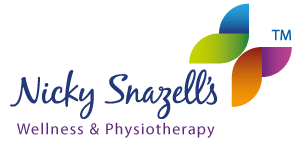“A non-surgical, non-invasive alternative for pain relief
and musculoskeletal repair.”
Shockwave therapy is a modern and highly effective treatment option in orthopaedic and rehabilitation medicine. The term shockwave refers to mechanical pressure pulses that expands as a wave in the body.
Radial shockwave was extensively used in mainland Europe for many years before being introduced to the UK. Due to this, radial shockwave is still not commonly available here, but its acceptance is growing, in part helped by gaining NICE approval for some conditions. Our clinic was at the forefront of radial shockwave introduction, following training for Nicky & Alan by an Orthopaedic Consultant who runs a major shockwave clinic in Luxembourg.
Extensive research around the world is continuing to push the boundaries at a rapid pace and many new applications are constantly being developed, so expect more updates in the future.
How does it work?
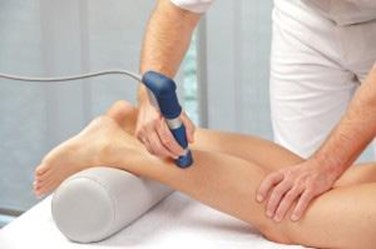
The shockwave is created by firing a high energy projectile into the back of a transmitter, the front of which is in contact with the patient’s body. The projectile is fired repeatedly at a frequency and energy level to suit the particular condition being treated.
The transmitter sends a high energy acoustic wave into the body.
The energy promotes regeneration and reparative processes of the bones, tendons and other soft tissues. Shockwaves are characterised by large changes in pressure.
Shockwave is particularly effective in the treatment of:
- Plantar fasciitis | Policeman’s foot
- Tendon calcification
- Adhesive Capsulitis | Frozen shoulder
- Achilles tendonitis
- Lumbar spasm
- Shin splints
- Piriformis syndrome
- Tennis / Golfer’s elbow
- Iliotibial Band Syndrome
- Osteoarthritic joint mobility
Many patients have come to us with osteoarthritic joints and have felt an immediate improvement in joint flexibility. For those who choose not to undergo joint replacement surgery, shockwave offers a maintenance alternative.
No Extra Charge
Typically, radial shockwave is charged at premium prices, sometimes running to hundreds of pounds per session, in part due to the relative newness of the technology in the UK and also due to the high price of the technology.
At our clinic there is no extra charge for using radial shockwave.
If you have a problem that radial shockwave could help with, then please call.
Call Now 01889 881488. Erica & Jean will be happy to help

I want you to imagine that you’re at a party with all your friends. Out of all of these people, how many do you think will still be alive at retirement age? How many will be flat broke? How many will be wealthy enough to help others? If we look at American statistics (which will be similar to our own in the UK), the answers to these questions may surprise you.
Out of 100 people at retirement age, only one would be wealthy. Four would be financially secure. Five would still have to work in order to afford their lifestyle. Fifty-four would be completely broke and thirty-six would be dead.
From Private Care Homes
We get patients to Nicky Snazell Clinic from Hammerwich, Burntwood, and around the Stafford area. Being fit for your care home will ensure that you enjoy it to the fullest and, as such, benefit from a longer and more active retirement.
Only 5% would be able to live healthy lives
Now, imagine you’re again looking around at your friends at the party. Only 5% of these people will be able to support themselves enough to live healthily at retirement age. This is why we need a life plan, and this is why we really need to think about where our lives are going. With that in mind, how old do you think your kids will live to? And does it matter where in the world they live?
Unfortunately, according to a CIA report, the average life expectancy of children who are born now is not as good as you might think. Broken down by country, people born in Monaco today will have the longest life expectancy of 89.6years. Here in the UK, it is 9.2 years less at 80.4. Right at the bottom of the table, we have South Africa with a life expectancy of just 41.0 years.
Health Is A Choice
Life Expectancy Is A Choice
This sounds shocking, but it is something that – here in the UK – we have the power to change ourselves, by transforming the way we think, what we eat, how we move, and what kind of lifestyle we choose to have. That’s right – it’s a choice.
We can choose to prove those UK figures wrong and live longer, healthier lives, or we can choose to do nothing, and watch as our life spans get shorter and shorter. It’s a decision we can actively make for ourselves, and it’s a decision that we shouldn’t have to spend too long contemplating. If we want to have longer lives, we have to start changing now.
Traffic Light Approach to Health
At my clinic, I ask my patients to fill in a questionnaire about their current health and their answers are incredibly useful in letting me see where they need to improve their mindset, their nutrition, their fitness and their lifestyle. This is no different to ancient doctors/shamans, who would listen and pray or teach meditation, teach movement, good healthy eating with clean water, and make sure the home and social network was healthy.
I call it the traffic light approach to health because we analyse these areas by seeing if the patient is green (good), amber (room for improvement) or red (poor).
These are your fitness keys, and they will tell you where you need to improve.

With this in mind, I have developed four questionnaires – one for each key and these are explained in detail in my first book, The 4 Keys To Health. If you want to get the most out of your health, then absorb the knowledge and implement some of my suggested changes into your life. You should soon start to see your traffic light scores changing from red or amber to green on all counts. When this happens, you are likely to be at your optimal health for your age, which means you’ll be giving yourself the best possible chance if a disease or injury should occur.
If you would like to find out more about your own fitness keys and get a plan for improvement, then call to see Nicky.
Call Now 01889 881488. Erica & Jean will be happy to help
The rotator cuff is a group of four muscles that work together to provide dynamic stability of the shoulder joint, helping to control the joint during rotation:
- Supraspinatus
- Infraspinatus
- Subscapularis
- Teres Minor
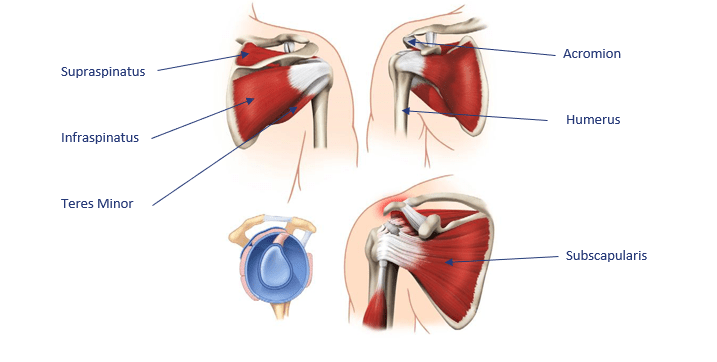
The Supraspinatus is a small muscle which you can feel above the bony ridge on the back of your shoulder blade (scapula). It attaches to the top of the arm bone (humerus), just below the shoulder joint. The task of this muscle is to move the arm sideways away from the body for the first 15 degrees. After that other muscles take over most of the load.
The Infraspinatus is a thick triangular muscle, which occupies the chief part of the sculptured dent in the back of the shoulder blade, below the bony ridge. As one of the four muscles of the rotator cuff, the main function of the infraspinatus is to turn the arm out as in the back hand in tennis, and stabilise the shoulder joint.
The Subscapularis is a large triangular muscle at the front of the shoulder blade, between the shoulder blade and the rib cage. It attaches to the top of the arm bone (humerus) and into the front of the shoulder capsule. Its role is to turn the arm in.
The Teres Minor muscle sits below the Infraspinatus. It is quite a small rounded muscle and its primary task is to stop the arm moving up when it is moved out sideways (abducted). It also helps the Infraspinatus turn the arm out.
TREATMENTS FOR ROTATOR CUFF TENDINITIS
Rotator cuff tendinitis describes the inflammatory response of one or more of the four rotator cuff tendons, due to impingement or overuse, and leading to more and more micro-trauma that can then lead to a tendon rupture.
The inflamed thickening of the tendons often causes the rotator cuff tendons to become trapped under the acromion (the bony projection of the shoulder blade over the shoulder joint) – like a carpet stuck under a door – causing sub-acromial impingement. Failure to heal then leads to further damage. Early treatment of tendinitis, therefore, is vital in order to prevent the development of more chronic and serious conditions.
Treatment can include: first and foremost scapula re-education exercises, postural exercises to lessen the impingement, gentle shoulder mobilisations and massage, aided by local electrotherapy, such as laser, pulsed shortwave, shockwave and deep oscillation. Specific rehab exercises can help guide you back to full fitness.
If you have shoulder pain or restricted movement, we can help.
Call Now 01889 881488. Erica & Jean will be happy to help
At least 60% of the UK population suffer from back problems. There are many causes for back pain, and one of those causes is a spine which becomes inflexible. In simple terms, there are 17 vertebral bones from the bottom of the neck to the base of the spine, and if we imagine that each of these should allow an element of rotation and flexibility, then if any of these joints become seized, it begins to cause problems in overall flexibility, resulting in pain.
Physiotherapy is an effective treatment for improving spinal flexibility. However, any therapists ability to manipulate spinal vertebrae is limited by the force and speed which they can apply with their hands over any extended period of time. Research has shown improved results can be achieved at higher cycles per second than is humanly possible. Theraflex robotic spinal manipulation provides the physiotherapist with a powerful technology to manipulate the whole spine at effective speeds with ease.
HOW DOES THERAFLEX WORK?
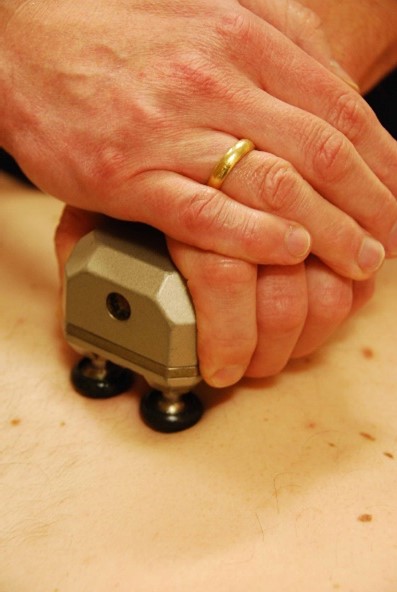
Theraflex has three modes of operation, each of which can be minutely adjusted for force and speed, thus matching the patient requirements exactly:
MUSCLE RELAXATION
On this setting, the device rapidly taps on the muscles either side of the spine. By running this up and down the spine, the physiotherapist is able to stimulate muscle relaxation along the whole length of the spine, quickly and effectively. Most patients find this setting extremely comfortable and relaxing.
REFLEX STIMULATION
The second stage of treatment involves stimulation of the spinal reflexes. This is achieved by a gentle tapping over the full length of the spine, triggering the spinal reflexes to create further relaxation in preparation for spinal manipulation.
VERTEBRAL MANIPULATION
In the final stage of Theraflex treatment, the physiotherapist is able to manipulate each neighbouring vertebrae to move independently of each other, reducing the friction between them. In practice, the treatment mobilises the facet joints between each pair of neighbouring vertebrae. The net result of this treatment is to regain the flexibility in the full length of the spine, as originally intended. To achieve this, several treatments may be required, as each treatment progressively improves flexibility.
WHAT DOES THERAFLEX TREAT?
Theraflex is able to treat a number of conditions, the most common being general stiffness of the spine, but we have also successfully treated:
- Mild Scoliosis, a mild side flexion in the spine
- Mild Kyphosis, hump back posture
It also helps with the symptoms of:
- Osteoarthritis
- Sciatica
- Spinal Disc Pain
THERAFLEX AS PREVENTATIVE TREATMENT
As a maintenance treatment, Theraflex helps keep the spine supple and prevents many of the pain problems associated with a stiff spine. For example, golfers have improved their handicap by improving their golf swing smoothness, thanks to increased spinal flexibility.
If you are suffering back pain or a stiff back, then our Theraflex robotic spinal manipulation will help.
Call Now 01889 881488. Erica & jean will be happy to help
Vertigo is a problem that affects around half the population at some point in their lives and is more common as we get older. Fortunately the symptoms usually only last for a few seconds to a minute or so, but the symptoms are very unpleasant including:
- Nausea and vomiting
- Dizziness
- Fainting
- A sense of rotating
- Inability to stand or walk
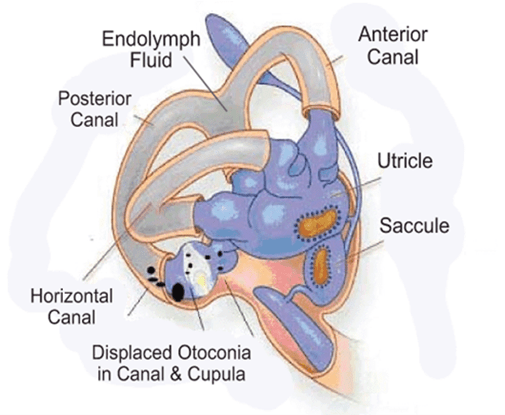
By far the most common cause of vertigo is BPPV (Benign Paroxymal Positional Vertigo) and this is linked to the 3 semi-circular canals in the inner ear. The role of these canals is to sense the position of the head in the 3 axes of up /down, right / left, forward/ backwards. If any incorrect signals occur, the brain doesn’t know where your head is and gets confused.
Faulty signals are caused by very small chalk crystals becoming loose and getting into the semi-circular canals. These loose crystals then move in the canals, stimulating faulty signals.
The types of movement which most frequently initiate a vertigo attack are rolling over in bed, getting out of bed, sitting up after lying flat or looking up or down.
Treatment
Left untreated, vertigo will usually resolve itself but may take several months. Fortunately treatment is fairly simple and painless and typically no more than 3 specialised physiotherapy treatments are needed over a couple of weeks.
David Paling, a senior physiotherapist and our clinical lead can diagnose and treat BPPV.
If you or someone you know is suffering with vertigo, call us to book BPPV physiotherapy treatment with us.
Call Now 01889 881488. Erica & Jean will be happy to help
Many of you may have heard of foot pain which is commonly referred to as ‘Policeman’s Foot’, presumably because police were prone to this condition in the past when they walked the streets. Those suffering will feel pain in the heel and arch of the foot, typically first thing in the morning and then easing as you move more. Medically this has been described as Plantar Fasciitis. ‘Itis’ means inflammation and thus plantar fasciitis means inflammation of the plantar fascia, the latter being a thick band of tissue connecting the heel bone to the toes.
Plantar fasciitis is also increasingly referred to as plantar fasciopathy, as there is evidence that the subsequent pain is not just a result of inflammation and may be a result of overstimulation. This can lead to the tissue being less able to withstand strain placed on it.
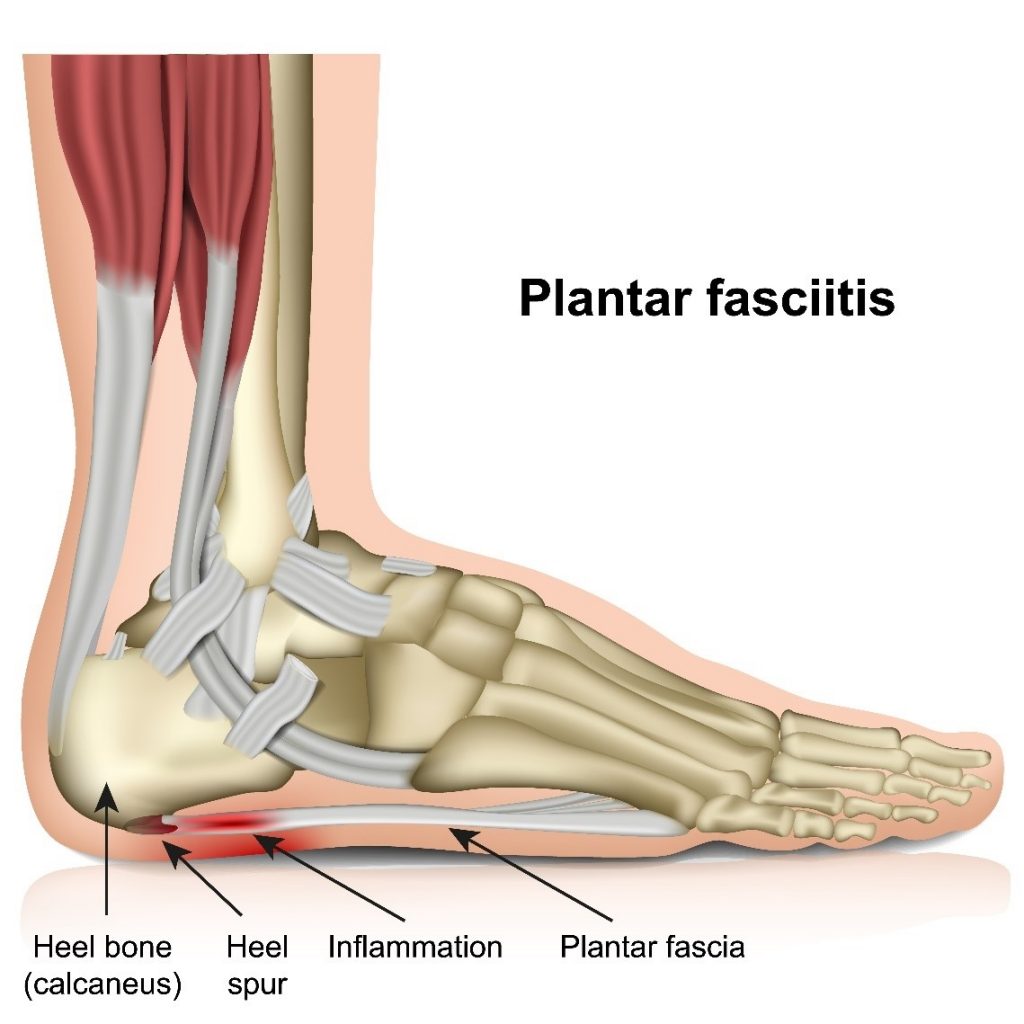
What are the symptoms
The primary symptom of plantar fasciitis is pain slightly forward of the heel, where it is tender to the touch, but pain can be anywhere on the underside of the heel. The pain is most intense during the first steps after getting out of bed or after prolonged periods of sitting.
Gentle exercise may ease things a little. On the other hand, long walks, being on your feet for a long time or thin soled, unsupportive footwear often makes the pain worse.
Contributing factors
- Being overweight
- Tight calfs
- Wearing unsupportive or flat shoes
- Loss of arch in your foot
- Changes or overload to activity levels
- Jobs which involve standing for long periods of time
Treatment
Most cases of plantar fasciitis will get better by themselves, but can take weeks and anything up to 18 months to resolve without treatment.
Typical steps that you can take are:
- Relative rest from any aggravating factors
- Modifying your activities
- Pain relief and anti-inflammatories
- Ice can help relieve symptoms and will act as an anaesthetic when applied for 10 minutes two to three times a day
- A gel heel cup to lessen compression forces on the heel
- Self massage
- Roll golf ball under foot
If these don’t help quickly enough, then we can help with improved diagnosis, appropriate treatment and a properly devised rehab plan.
Radial shockwave treatment is particularly successful at treating plantar fasciitis. Deep tissue massage of the calf muscles will lengthen the muscles and help to relieve tension on the plantar.
If you are suffering with heel or arch pain, which you want to resolve as soon as possible, we can help with both a high level of expertise and latest radial shockwave technology. Of particular importance to you, we do not charge extra for radial shockwave, even though we were one of the first clinics in the country to introduce radial shockwave. Many other radial shockwave providers charge premium pricing, but we do not.
Call Now 01889 881488. Erica & Jean will be happy to help
Every now and then something information comes along which is so important that you have to sit up and take notice. This is one of those times, so I urge you to take the time to read this and take it seriously.
It’s good news for a change
The following information is taken from a video recorded by Professor Roger Seheult, an American Medical Doctor.
I will summarise the information in the video. For those who want a greater understanding or watch it all, here it is:
Summary
Professor Seheult discusses the results a many studies in connection with the impact of Vitamin D on acute respiratory infections (ARI), including influenza and COVID 19. Many of the studies are observational, which means that there could be other factors other than Vitamin D which are causing the observed reactions. He does however also discuss randomised, placebo-controlled studies, which are the gold standard, in which the outcome of Vitamin D supplementation is measured.
Sources of Vitamin D
Vitamin is short for vital amine. Vital means it’s essential for life. An amine is a type of chemical. We can only produce enough Vitamin D if we have enough sunlight or by dietary intake.
A problem is that we only spend 7.6% of a day on average outside and that in winter, with shorter days and a much lower sun, we cannot absorb enough UV B rays to produce the Vitamin D we need. In fact, studies have shown that if you live above the 35th parallel, you can’t get enough sun in winter. Our problem is that the 35th parallel is south of Spain, so in the UK, there simply isn’t enough winter sun. That leaves dietary intake as our only means to get the vitamin D we vitally need.
Historical Observations
- We have known for over 100 years than Vitamin D deficiency is inked to an increase in infections.
- We also know that as we age, we are less able to produce Vitamin D from sunlight. Typically, a person over 70 produces less than half that of an 18 year old.
- Obesity decreases the availability of soluble Vitamin D.
- Vitamin D levels are highest amongst white skinned races and decrease with skin darkness.
- The months where Vitamin D deficiency is at it’s worst coincides with spikes and increases in the flu
Studies
A British meta analysis of 25 gold standard studies, which means they grouped all the studies together to get an output, concluded that increased Vitamin D levels in the body did decrease ARI’s. It was recommended that Vitamin D fortification in food was implemented to improve Vitamin D levels.
A study of influenza in schoolchildren showed that those who were supplemented daily with Vitamin D had a 10.8% prevalence to getting the flu, compared to 18.6% for those given a placebo.
COVID
A study of mortality from COVID showed 3 significant factors:
- Age
- Obesity
- Race
These 3 factors are exactly the same as those with Vitamin D deficiency, which suggests a link.
Physical Location
COVID mortality typically increases the further away you live from the equator. There are exceptions as other factors play a part. For example, Nordic countries, which are a long way from the equator, have lower mortality than Spain or Italy, and this is thought to be because supplementation in Nordic countries is high, whereas Vitamin D deficiency in Spain and Italy is high.
All countries below the 35th parallel have relatively low COVID mortality rates, mirroring the sunlight observation cited earlier.
COVID Studies
- A study of 14,000 COVID positive patients in Israel showed that low Vitamin D levels doubled the risk of hospitalisation
- A USA study of 191,000 patients COVID positivity rate showed a clear inverse relationship with Vitamin D level. The higher the Vitamin D, the lower the rate. This study also looked in detail at the rate by geography, race, age and sex and found that in every case the higher the Vitamin D level, the lower the rate.
- A study of 20 European countries looked at the number of cases and mortality of patients compared to the average Vitamin D levels in each country and found an inverse relationship. i.e. the higher the Vitamin D, the lower the number of cases and the lower the mortality.
- A randomised controlled study of COVID positive patients who were given Vitamin D supplements, showed 2% went to ICU, compared to 50% from the placebo group. This study was only 76 patients and is going to be repeated with a larger population.
- A French study of nursing home patients showed that those who were given 80,000 iu per 2 to 3 months had a much higher survival rate than those who hadn’t had any Vitamin D in the previous month.
Conclusion
There is a very positive message here and it’s good news for a change
Clearly a lot of studies are suggesting there is a strong correlation between Vitamin D levels and acute respiratory infections (ARI). Evidence shows that COVID cases, ICU and mortality are all inversely proportional to Vitamin D levels. That means the higher your Vitamin D level, within limits, the lower your chances of getting COVID, needing ICU and it being fatal.
It is very important that you do NOT read this and think that this is an alternative to a vaccine. The only real hope we have of beating COVID is by mass vaccination.
However, the evidence suggests that you can tip the balance strongly in your favour by simply ensuring your Vitamin D levels are sufficient.
Really it’s a no brainer. Why wouldn’t you do this?
This does pose a problem, as firstly there is no agreed level for daily intake. Some suggest 4000 iu, others up to 10,000 iu. Secondly, I am not qualified to recommend anything here and suggest you talk to your GP or chemist.
Nicky & I have been strong advocates for vitamin supplementation for many years. We have increased our daily intake to 9000 iu as a result of this video. That’s a personal choice and is not a recommendation to you. Get professional advice
We are looking for a senior MSK physiotherapist to join our triple award-winning private clinic, located in a beautiful grade II conversion, in stunning countryside near Stafford.
We have a well-established professional, happy and motivated team who provide the very best hands-on treatment and have an enviable reputation, rated 5 Star on Google, with a client base covering the whole of the UK and many from abroad. The clinic owner is a leading exponent of IMS dry needling, has written 5 books on health and is an international lecturer on pain and health. The clinic offers a tremendous learning environment and is very well equipped with a broad range of the latest electrotherapy equipment.
We treat predominantly MSK conditions, including specialist spinal pain treatment, physiotherapy, sports therapy, biomechanical assessment and massage. The clinic ethos is that prevention is as important as treatment and that wellness is an integral part of everything we do.
The Role:
We are looking for a senior MSK physiotherapist for 3 or more days a week, or, alternatively, two physiotherapists for 2 days a week. The successful candidate will be able to demonstrate excellent MSK and people skills and be a team player.
The role will offer MSK specialist physiotherapist support where necessary, in house training plus a training budget pro rata.
Key Responsibilities:
- To provide a high standard physiotherapy service to a variety of patients, predominately musculoskeletal and rheumatological, and those with orthopaedic conditions.
- To provide high standard of physiotherapy assessment and treatment using the biopsychosocial approach to patients with a variety of conditions, as an autonomous practitioner.
- To provide a clinical diagnosis and to develop and deliver an individualised treatment program, as an autonomous practitioner. Self-management tools should be identified, discussed and followed up with the patient.
- To be legally and professionally responsible for a high-level clinical caseload of musculoskeletal patients as an autonomous practitioner.
- Liaise with the multidisciplinary team and other staff members regarding patient management as necessary.
- As part of a learning environment, you will be expected to take part in the supervision and education of both undergraduate and postgraduate students.
Applicant Requirements:
- Qualifications: Chartered Physiotherapist and preferably an acupuncturist
- Experience: Minimum of 4 years working in the UK, plus evidence of post-grad CPD
- Compliance: CSP, HCPC and preferably AACP registrations.
Package
- £33,000 to £40,000 pro-rata
- Bonus scheme
- Pension scheme
- Sickness cover
- 28 days holiday pro rata
- Flexible hours
To apply or for further information please email nickys@painreliefclinic.co.uk
What happens in a drought? A hose pipe ban, a car wash ban, shorter showers, less water in the bath. We all protect the vital stuff, like making sure we and our animals get water. Fortunately, we live in a country with more than its fair share of rain and our droughts don’t last too long, so a drought tends to be more of a temporary irritant than a serious problem.

But what if a drought did last for a long time? What would happen to our gardens if they hardly ever got watered? Well, a lot of very poorly and dead plants, and lawns that wouldn’t win any prizes for sure.
It’s doubtful anyone would argue with the above in principle, after all it’s stating the blindingly obvious.
If it’s so obvious then, why is it that at least 75% of us and maybe as many as 90% are long term dehydrated? Given that plants left dehydrated long term will get weak and die, then it should come as no surprise that our complex bodies are likely to suffer the same fate. Why do we put ourselves at this risk? Find out how dehydrated you are by answering this simple questionnaire:
Do you rarely have thirst / dry mouth?
Do you rarely get headaches?
Is your urine a mild (not dark) yellow colour?
Are your skin and lips moist, not dry?
Do you have regular bowel movements most days?
Do you have less than two glasses of alcohol a day?
Do you have five helpings of fresh fruit and vegetables a day?
Do you have several glasses of fruit water / juice / herbal teas a day, even if resting?
Do you avoid having too many salty snacks?
Score 1 for each Yes. Total 0—3 Red, 4—6 Amber, 7—9 Green. Get Nicky’s ‘4 Keys To Health’ book for more information.
Your body will start to react to dehydration with as little as a 1% drop in availability and a priority system will start to kick in. Your brain needs a lot of water and your organs functions are vital. These will get priority, because these are more critical to life. Non critical body parts will get a bit of what is left.
Up To 90% Of Us Are Dehydrated
The list of potential problems from dehydration are huge and are linked to many diseases. The implication to overall wellness is obvious—stay dehydrated at your peril. As a clinic which treats patients every day with pain and injury, here are some dehydration issues we see:
- Just about every joint in your body has cartilage, which needs to be kept hydrated to stay healthy. Dehydrated cartilage will promote inflammation, pain and arthritis.

- Spinal discs need to stay moist and supple. Without adequate hydration this could cause a multitude of spinal problems.
- Muscles will cramp, swell, become tender, have reduced strength and possibly suffer tissue damage.
- Dehydrated tendons and ligaments can make you more prone to injury, pain and inflammation.
Long term dehydration is clearly serious and is linked to many diseases. So why are we so prone to dehydration when it is so easy to fix?
Your Body Has Drought Management
Many studies have shown that what we drink is just as important as how much we drink. In the UK caffeine loaded beverages like coffee, tea and sodas are prevalent. In fact, most of us don’t drink water at all.
The problem with caffeine, if concentrated, is that it is a diuretic which in many cases stimulates us to lose more water than we consume in the drink itself. Thus, drinks like this act to dehydrate, not hydrate.
This issue is contentious and we have to accept that many arguments will have a financial motive. But let’s use common sense. Most people in the UK drink tea and coffee as their main source of fluid intake. If these drinks are not diuretic, then how come nearly 90% of us are dehydrated?
There are many social factors which prevent adequate fluid intake as well. People whose environment does not provide easy access to a toilet, such as drivers for example, are very prone to low fluid intake.
A further factor is with the elderly, who simply don’t register they are thirsty in the first place, plus don’t want to drink too much to reduce visits to the loo.
Here are some simple guidelines on how to stay properly hydrated:
- Drink water as well as diuretic drinks. Recommendations vary but aim for about 1.2 litres per day
- First thing in the morning drink a big glass of water, not tea or coffee.
- If you are feeling hungry, it may be you are thirsty. Drink some water first as that quenches hunger.
- If you are feeling lethargic in the day, drink some water. Lethargy is an early sign of dehydration.

If you are concerned about your hydration level and would like an accurate measurement, we have some very clever Quadscan technology that will analyse your hydration levels in detail. The test is painless and will take about 20 minutes. Ask at reception for details.
Call Now 01889 881488. Erica & Jean will be happy to help

Last night the PM announced we go to Tier 5, a newer and bigger iceberg for us to sail around.
We remain open as we are considered an essential service
As we have reported to you in recent weeks, this pandemic will inevitably cause a lot of emotional and physical pain and we are here to help. The whole team is available and our opening hours remain the same.
If you are in pain, call us. We can help.
Call 01889 88144
